My Life in the Bush of Books, Part 2
Franzen Vs. Frampton in a Smackdown
Special

|
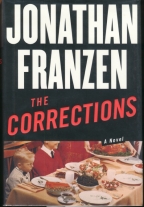
|
|
What does this album have in common with that book?
|
Both will be *real* easy to find in the used
{book,record}store in about ten years....I am so incredibly
cool that my copy doesn't even have the controversial
sticker on it.
|
The Agony Column for May 9, 2002
Commentary by Rick Kleffel
Yes, I know, I live in a book ghetto. I made it very carefully,
brick by brick, book by book. I am a one hundred percent certified by
myself book geek. If I'm shopping online, it's for books. If
something comes in the mail, and it's NOT a bill, it's a book. There
is no wall in my living room, dining room, studio, or even hallway
that has escaped the curse of the bookshelf. If I close my eyes I can
count 9 piles of books, four or more books high.
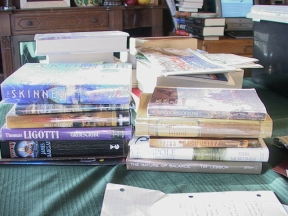
|
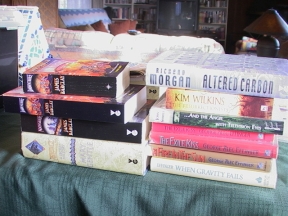
|
|
The dining table collection features Neal Asher,
Thomas Ligotti, Kingdowns of Elfin (top right), 'Hippolyte's
Island', Brian Lumley rescued from the stacks for scanning,
Rumpole, and 'The Nature of Balance' hardcover by Tim
:Lebbon from Prime Books.
|
The lefthand side is a big-stack o' fantasy. The right
side is my Effinger memorial, topped by John Shirley, Kim
Wilkins and Richard Morgan. Morgan's on the way out today,
about to bew loaned to a friend. Lucky her!
|
What's worse, is that a pretty big
chunk of those books -- say, 60 to 70 percent -- could be classified
as genre literature with nary a qualm. Now it's not all just one
genre. Just when readers are used to getting and happy getting horror
reviews here, I switch gears and start spewing on science fiction.
And when the SF gets thin, there's more than a bit of fantasy to take
care of. (Has anyone read 'Wanderers
and Islanders' yet? It's definitely in the queue.)
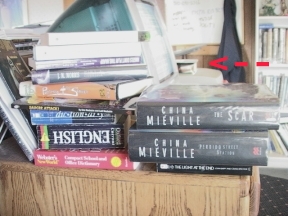
|
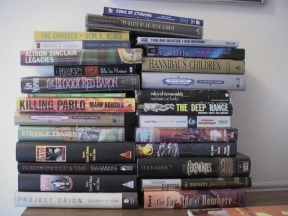
|
|
The Red arrow is pointing to the current locatin of
Jonathan Franzen's 'The Corrections'. I had to scan my copy.
It was easy to find and had wear signs that show character,
IE, I actually read the damn thing. But it's hemmed in by
lots of great genre fiction. The over-exposed white spines
are (going down) 'Wanderers and Islanders' by Steve Cockayne
and Tom Standage's 'The Turk'. (more on those later)
|
Here's my impressive hallway pile. Note the Arthur C.
Clarke hardcovers rescued from my local used bookstore. I
was about 12 years old when I first read 'The Deep Range'.
I've yet to get around to reviewing 'Killing Pablo', which
just came out in paperback. I really liked it. Top o' the
stack belongs to Mark Rainey's Song of Cthulhu'
collection.
|
But not everything I read is classifiable as genre fiction.
Sometimes, it starts to seem like my brain is enveloped in a thick
layer of hallucinogenic dust or fog, and I know it's time to clear
out. Other times, a book just catches my interest and doesn't let it
go. And I find if I buy a more normal, mainstream book, often I find
that I enjoy it. Remember that I put the same kind of research into
buying any book, no matter what the genre. And the same tenet always
applies -- I don't want to waste my time reading a bad book.
As I post old reviews to the
archive site, I find myself digging up a lot of non-fiction and
non-genre books of late. I have a couple still on the to-be-reviewed
list. And my short-list queue is nearly (for me) overrun with
non-genre fiction. So it's time to clear it out and 'fess up. Yes, I
have read and enjoyed an Oprah Book Club book.

|

|
|
Yes, I'll cop to once owning this album too -- and
even to listening to the whole thing!
|
...just as I'll cop to reading this novel. I'll give
the novel higher marks, benefiting greatly from my
near-perfect Hindsight.
|
That book would be in the just-loaned pile, and it's of course
Jonathan Franzen's 'The
Corrections'. Silly me, he was in town and signing copies
(pre-Oprah), but I had already bought mine. So what possessed me to
purchase and read almost immediately upon purchase a 557 page Great
American Novel cum soap opera? The good reviews I had read intrigued
me, but there was a very real, very personal reason to purchase this
novel. In it, one of the main characters is described as having
Parkinson's disease. That ailment is part of my life. (No, I don't
have it, but a close relative does.) I knew what little I'd learned
of it from attending doctor's appointments, and precious few of them.
I thought I'd see what the novelist of the week had to say about it.
I wanted to catch Franzen with his pants down, see if he over-hyped
the symptoms.
As it developed, I didn't need to catch Franzen pants-down -- he
performed that stunt all by himself. And his novel was rather
compelling. I read all 557 pages in a little over a week. I have to
admit I really enjoyed it, with some reservations.
Those reservations certainly wouldn't be for dinner with any of
the unpleasant characters. But Franzen's look at reality has quite a
bit going for it, and some of what it has going for it appealed
directly to the genre geek within. OK, here's the skinny -- Gramma
Enid and Grampa Alfred are in rapidly declining health. Grampa has
Parkinson's, Gramma's a neurotic Betty Crocker. She wants he family
to come home for a big Christmas feast. Number one son, Gary, the
eldest, married wit children is obsessing about whether or not he's
clinically depressed. And as he does, Franzen trots out a neat bit of
research, and has his character worry in detail about the levels of
various chemicals in his bloodstream. It all has a very enjoyable,
dark-humored science-fictional feel to this grasping though tiny
brain. Whenever Franzen was with his worried eldest son, I was
enjoying the book.
Of course, there are two younger siblings with varying
reading-enjoyment levels. Chip, younger son, is bit of a sleaze who
finds himself in more trouble than he can handle. Franzen does a
decent job here as well, keeping things entertaining as he cranks out
the angst. And finally, there's youngest daughter Denise, who has a
purse full of troubles. They're relationship woes and sexuality woes
of mildly prurient interest.
Neurotic Gramma Enid is every bit as annoying s you might think,
and Grampa Alfred's Parkinson's seemed at first to be rather floridly
exaggerated. Now, the exaggeration was enjoyable to read about,
because Alfred has some pretty wild hallucinations as a result of
Parkinson's. He also has some nicely humorous issues with moving his
limbs. Well, wittily rendered, at least. The vividness -- the
solidity of his hallucinations at first struck me as rather overdone,
but in the fullness of time (as a result of my own experiences), I
came to understand that yes, Parkinson's hallucinations are very
dreamlike and vivid. And while they can be caused as much by the
cures as by the disease, I couldn't really fault Franzen for florid
exaggeration.
Now I could fault his editor for not making Franzen trim the book
down to the standard length of 350 pages. A shorter book might have
made the soap opera aspect less glaring. I could fault Franzen for
making a butt of himself with regards to his nominations for literary
prizes, not the least of which was admission to a certain book club.
This book may be far too realistic and far too long for the average
genre reader. But it's finishable, and I was rather glad I read it.
I'd probably read his next book. At least Franzen didn't go on about
elves and magic and swords for EIGHT 600 page-plus bricks.
|

|
|
The very cool cover art for 'Positively Fourth Street'
does justice to the wonderful writing inside.
|
But wait -- there's more. I'm also using this column to cop to
reading 'Positively
Fourth Street'. And hey, I'm unrepentant about it. I glommed on
to this book while driving around and listening to NPR. The author,
David Hajdu was being interviewed about his history of Bob Dylan,
Baez (Joan), Baez (Mimi, later married to...) Richard 'Been Down So
Long it Looks Like Up to Me' Farina. As I listened, my first thought
was that my wife would love to read this book. Readers might have
gleaned somewhere along the line that I live in Santa Cruz County,
and do my "local" book shopping there. From this fact, it's half a
step to figuring out that the local bookstore had a big ol' table
filled with Hajdu's novel, and had, in fact just had a signing (which
I missed, of course). At least the book was easy to get.
But what I discovered when I brought it home was that the damn
thing was really, really compelling and something of a page-turner.
The wife and I had to jostle for reading rights. I prevailed. Now,
there's nothing in the least bit genre-oriented about 'Positively
Fourth Street'. It gets its grip on the reader the old fashioned way
-- it earns it. Hajdu has simply found a very fascinating little
corner of history and he simply lays it out as if it was all there
for him neat and tidy. From Joan Baez as a child in Palo Alto to Bob
Dylan's voice-changing motorcycle accident. He trims what's
in-between to focus on the very sixties soap-opera lives of these
four varyingly talented individuals.
Part of the fascination of 'Positively Fourth Street' is that
every reader knows how it all turned out 40 years down the line. That
means that what Hajdu does and does so incredibly well is create
tension in showing the reader how exactly they got there. It happens
that each of the four participants got to their destination by virtue
of their personalities, and Hajdu lets us see them in development,
against the backdrop the folk music scene and America in an earlier,
gentler time. If it weren't true, 'Positively Fourth Street' would be
Great American Novel material of the first degree, though it might
seem a bit florid.
(Maybe Franzen could have offered a coda set in the year 2040,
with his various characters having achieved something. But then when
Literary Authors do Genre Fiction, we know to be Afraid. Very
Afraid.)
But at 298 pages, 'Positively Fourth Street' is like a blast of
fresh air, and I read it very quickly. It showcases great ambition,
deep betrayal, modest success and dismal failure. Hajdu's characters
-- his portraits -- are not bigger than life, they're just life size.
In the year 2002, we're at the far end of the telescope. For most of
us, Bob Dylan and Joan Baez are almost astronomically huge figures.
Hajdu takes us back to the eyepiece, when Dylan and Baez were young,
unproven but ambitious talents. Genre geek or not, there's a good
chance that any honest reader is going to enjoy 'Positively Fourth
Street'.
|

|
|
A fantastic effort from a talented writer -- buy this
book for your friends and amaze them with your clever
taste.
|
Sometimes a genre-based author does a reversal of the
literary-author-slumming-in-a-genre schtick. In 'Strange Trades' Paul
Di Filippo offers up a fascinating bit of what he calls financial
science fiction, amongst other things. I haven't read every story in
this Golden Gryphon collection, but I've enjoyed every story I have
read. And his 'Spondulix' is definitely one of those "I wonder why
nobody thought of that before?" stories, and rather of a kind with
the rest of today's crop. 'Spondulix' has not a whit of science
fiction in the normal sense about it. It could in fact happen. It's
about a man who accidentally creates a new form of currency and the
trouble that ensues. Have you ever read a story or a book where the
writer just takes a runner out over what appeared to be a cliff?
Where they head out into the blue yonder as if there were a road
running straight up to some place that the reader has never imagined?
An unimaginable place the writer seems to see as solidly as the stop
sign in front of the school where he drops off his kids? 'Spondulix'
is that kind of writing, as are the other stories in this collection.
Also, in case, you've been asleep, these folks at 'Golden Gryphon'
seem to be cornering the market on beautifully produced collections
of stories by authors of great quality. Seeing the announcements of
their latest collections makes me afraid that at some point I might
take the short journey to fiscal irresponsibility and simply buy the
whole damn catalogue. I'm fighting it. It's a one-day-at-a-time
thing.

|

|
|
Mark Morris by any name is a great writer. Those who
loved his excursions into horror will certainly enjoy this
book. Ruth Rendell and Mo Hayder fans should take a peek as
well -- you won't be disappointed.
|
One of those irresistable non-fiction books I heard
about on NPR. If NPR ceased to broadcast, we'd probably
forget how to read. Or miss out on lots of great books.
|
The future, alas, promises only more normality. In reading as well
as reality. I have to admit I'm looking forward to the return of my
hallucinogenic fog. But I have some rather entertaining ways to
dispel it. I'm currently about halfway through 'Fiddleback'
by J. M. Morris. It's the 'suspense thriller' debut by noted horror
writer Mark Morris. I'll tell you right now. This is probably not a
book you should give your wife or girlfriend. Or (as appropriate) you
should read unless you have a fairly high tolerance for
Unpleasantness. Morris is a fantastically talented writer who is
willing to use the psychological thriller genre to Scare the Crap out
of you. He writes as if were Ruth Rendell's dangerous brother. I do
not think it is a coincidence that the main character in 'Fiddleback'
is named Ruth. It's also no coincidence that 'Fiddleback' is a
wonderfully well-written novel. Morris' debut novel 'Toady'
(sold in the US as 'The Horror Club') stands out, shines across the
years as a novel still containing greatness. 'Fiddleback', however,
is decidedly non-supernatural, and about as 'normal' as Morris is
going to get. Check out the cover for his collection 'Close
to the Bone' before you read 'Fiddleback'.
But just underneath 'Fiddleback' in the queue is another bit of
darn non-fiction. What's the matter with me? Well, in this case
nothing -- if it weren't non-fiction Tom Standage's 'The
Turk: The Life and Times of the Famous Eighteenth Century Chess
Playing Machine', would probably be novel by either Tim Powers or
James Blaylock (or maybe both). In fact, come to think of, the facts
portrayed in this book may have provided some inspiration for
Blaylock's 'Homunculus'. Standage tells the story of Wolfgang Von
Kempelen's 1769 invention. This was a mechanical man, made from wood,
powered by clockwork, fashionably attired in a Turkish costume and
capable of playing excellent chess. How did he do it and who saw it
and what did it inspire them to do? Standage tells all in 271 pages,
indexed with lots of notes. Empowered by my last rather successful
reading experiment in nonfiction, George Dyson's 'Project Orion', I
can hardly wait to dig into this.
Of course, after that summer is upon
us. And though I've already knocked off one of the big summer novels,
China Mieville's 'The
Scar', there are still quite a few to go. Summer weather is
excellent in Santa Cruz, characterized by a daily incursion of a
hallucinogenic fog.
Thanks,
Rick Kleffel










